We use cookies to make your experience better. To comply with the new e-Privacy directive, we need to ask for your consent to set the cookies. Learn more.
Electronic Locks
Benefits of Using Electronic Locks:
Using an electronic lock allows you access to activity logs, prevents losing keys, enhances security and allows you to control who accesses the area remotely . It is also a convenient way of giving multiple people access to one space, with functions that are easy to use.
-
 1122-EL IoT Electric Locking Swing Handle wit ...
1122-EL IoT Electric Locking Swing Handle wit ...SPECIFICATIONS AVAILABLE
- Lock Types: Key Locking 333 (Keys supplied)
- Colour/Finish: Black Textured Powder Coated
- Material: Die Cast Zinc Alloy, Polycarbonate
- IP Rating: IP40
- Security Type: Biometric, IC Card, Key Locking, Keypad, RC
- Communication Method: RS485
- Fire Rating: UL94-V0
- Security Class: RC 2
Price Range:
P.O.A -
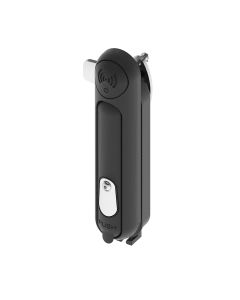 1504 Electronically Locking IP66 Swing Handle ...
1504 Electronically Locking IP66 Swing Handle ...SPECIFICATIONS AVAILABLE
- Lock Types: Key Locking (custom key, keys supplied)
- Colour/Finish: Black Textured Powder Coated
- Material: Die Cast Zinc Alloy
- IP Rating: IP66
- Security Type: IC Card, Key Locking, RC
- Cam Option: Range available
- Communication Method: RS485
- Fire Rating: UL94-V0
- Security Class: RC 3
Price Range:
P.O.A -
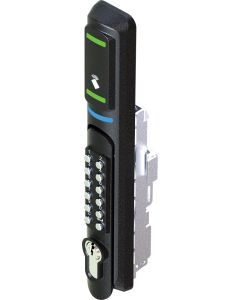 1507 Electronically Locking Swing Handle IoT ...
1507 Electronically Locking Swing Handle IoT ...SPECIFICATIONS AVAILABLE
- Lock Types: Key Locking (custom key, keys supplied)
- Colour/Finish: Black Textured Powder Coated
- Material: Die Cast Zinc Alloy, Nylon 6 GF30
- Panel Cutout: 25x150mm
- Panel Thickness: 1.5 - 2.5mm
- Barrel Height: 18mm
- IP Rating: IP40
- Security Type: Biometric, IC Card, Key Locking, Keypad, QR Code, RC
- Cam Option: Range available
- Communication Method: RS485, Wiegand, SNMP
- Fire Rating: UL94-V0
Price Range:
P.O.A -
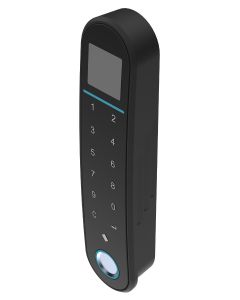 1509 Electronic Locking System for Magnetic D ...
1509 Electronic Locking System for Magnetic D ...SPECIFICATIONS AVAILABLE
- Colour/Finish: Black Textured Powder Coated
- Material: Die Cast Zinc Alloy, Polycarbonate
- IP Rating: IP40
- Security Type: Biometric, IC Card, Keypad, RC
- Communication Method: RS485
- Fire Rating: UL94-V0
- Security Class: RC 2
Price Range:
P.O.A -
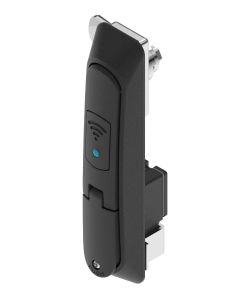 1511 Electronic IP65 Swing Handle Lock in Bla ...
1511 Electronic IP65 Swing Handle Lock in Bla ...SPECIFICATIONS AVAILABLE
- Lock Types: Key Locking 333 (Keys supplied)
- Colour/Finish: Black Textured Powder Coated
- Material: Die Cast Zinc Alloy
- IP Rating: IP65
- Security Type: IC Card, Key Locking, RC
- Cam Option: Range available
- Communication Method: RS485
- Fire Rating: UL94-V0
- Security Class: RC 3
Price Range:
P.O.A -
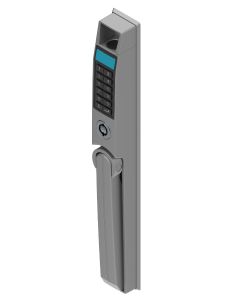 1519 Electric Swing Handle IoT in Silver with ...
1519 Electric Swing Handle IoT in Silver with ...SPECIFICATIONS AVAILABLE
- Lock Types: Tubular (Key Operated)
- Colour/Finish: Matt Silver
- Material: Die Cast Zinc Alloy
- Panel Thickness: 1 - 8mm
- IP Rating: IP40
- Security Type: Biometric, IC Card, Key Locking, Keypad, RC
- Communication Method: RS485
- Fire Rating: UL94-V0
- Security Class: RC 1
Price Range:
P.O.A
Locking Mechanisms and Input Types:
Biometric: Biometrics use your biological information to unlock secure spaces – our electronic locks use fingerprints . An advantage of using a biometric locking system is that your space will be extremely secure due to biological replications being hard to achieve. You will also save time unlocking the lock as instead of looking for a key, you just need to place your finger against the access point.
An IC (integrated circuit) card holds data which is stored on memory chips and microprocessors. The card gives you access to a locked space by simply tapping it against the electronic lock. These are difficult to be replicated and are convenient due to the user being able to keep it on their keys or a lanyard. They are also considered to be a cheaper option rather than having to get various keys cut.
Traditional Key: Having a traditional key locking system has advantages as you do not need a source of electricity – some people may find this more convenient and easier to install.
Keypad: A Keypad locking system uses a numerical code to unlock a lock. Keypad locks are extremely convenient as you do not need to remember to carry anything around with you and it is impossible to lose the key! You also would not need to get multiple keys cut for different people, instead you can just share the code with them. Keypad locks are secure, and many have a restriction in place which only allows a certain number of wrong entries, making it harder for intruders to get in.
QR Code: Users scan the code at the access point, and entry will then be approved. The lock will only open if the code is correct, making this modern locking system a great choice for security and convenience. It is also a cost-effective solution as there are no expenses for keys to be cut – they are all digital. Lots of QR code locks have databases which can show owners who has entered and at what time.
Material, Colour & Finish:
Die Cast Zinc Alloy: This is a strong material that has a melting point of 419.5°C and excellent corrosion resistance against water.
Nylon 6 GF30: This is an extremely durable and strong material, with resistance to moisture and chemicals, it is often used in industrial environments. Acids and alkalis may cause degradation to nylon 6 GF30.
Polycarbonate: This is very resistant to impacts, whilst being a lightweight material. It is resistant to hot temperatures and UV rays, making it ideal for many outdoor environments. Polycarbonate is corrosion resistant against various acids, oil, and grease.
For our electronic locks made from metal materials, we offer either a black powder coated or a matt silver finish. Black powder coating provides extra durability due to its resistance against scratches, colour fading, and chipping. Matt silver finish is mainly for aesthetic purposes, due to its non-reflective and smooth finish.
Customisation:
Our electronic locks will have one of the following lock types: key locking 333 (keys supplied), key locking (custom key, keys supplied), tubular (key operated). Each of these lock types have different key codes which are reflected by the number, design, and positioning of the teeth on one of these mechanical keys. For example, key locking 333 has up to 116 different combinations. Get in touch with us today for a keyed differently lock.
Security Class:
There are various security class categories that each electronic lock can fall under. RC 1 is a security class that protects against unexperienced intruders, and it is best suited to places with a low intruder risk.
RC 2 is a popular security class for places that have a normal burglary risk level from the occasional intruder. A normal risk will be reflected by your local crime statistics and will vary depending on the area.
RC 3 is a high level of protection against experienced intruders that may use heavy duty tools to break in. This security class is commonly found in places with a high risk of intruders.
FAQs:
Do these electronic locks work with all types of doors?
Each of our electronic locks will have a diagram on their product page showing the panel cut out. All our electronic locks are designed to fit industry standard panel cut outs – meaning they are compatible with the panel cutouts of branded lock products on the market.
Are Metrol’s electronic locks secure?
Yes, you can select your desired Security Class from the filters bar on the left . This is necessary to ensure you are choosing the ideal security level for your space. if in doubt, check the local crime statistics for the number of break ins and burglaries, this will help you determine the security class required. However, the value of the room, contents, and access should be the primary factor.
Can I get multiple locks that work with the same code?
Yes, in the product enquiry form on your desired lock you can request this.
Can I install a digital lock myself?
Electronic locks must be installed by qualified personnel due to their requirement for electricity.
Do electronic locks require electricity?
Yes, there is wired and wireless methods available.
Get in touch for more information:
Fill out the product enquiry form today to be one step closer to enhancing the security of your application. If you have any enquiries, please do not hesitate to ask our technical advisors via the live chat box or the enquiry form – we are more than happy to help.
Electronic Locks are an effective way to increase security in a convenient and stylish way. We have various electronic locks in different finishes and materials – ensuring there is a product suited to your application. Our electronic locks have individual IP ratings, determining whether they are ideal for indoor or outdoor use. Not to mention, the Security Classification ratings will help you in identifying which level of protection your application will need.
Electronic vs Mechanical Locks:
Mechanical locks do not need electricity or batteries to function. Some may find this more convenient due to their reliability and durability.
Mechanical locks can be unlocked by intruders who have experience. Electronic locks are much harder to manipulate and can therefore be considered as more secure.
Electronic locks allow authorised persons to quickly gain access to a space, whereas a mechanical lock would rely on the user remembering the key and not allowing it to be copied – which can be easy enough to do.
Electronic locks have modern day technology integrated into them, allowing for various security features to be implemented. For example, some electronic locks would allow you to set time delays for added safety. Another feature includes the ability to change the lock code from your device – this is easy and requires very minimal effort.
Mechanical locks are cheaper and easier to install, ideal for someone who wanted to buy a large quantity of locks that would require little upkeep.
Overall, a mechanical lock may be better suited to people who desire a simple, cost-effective, and reliable lock. Whereas an electronic lock would be suitable to those who require convenience, quick access, and upgraded security functions. Many people use a dual-lock system for added security, which is a mixture of both mechanical and electronic locks.
Considerations
| Feature | Mechanical | Electronic |
| Power Needed | No | Yes |
| Installation | Simple | Qualified Person |
| Security | Low | High |
| Convenience | Basic | Fast, Programmable Access |
| Features | Minimal | Logs, Remote Access, Code Changes |
| Cost | Lower | Higher Upfront, Lower Long-term Risk |
| Use Case | Budget & Simplicity | High Security & Easy Access Control |

